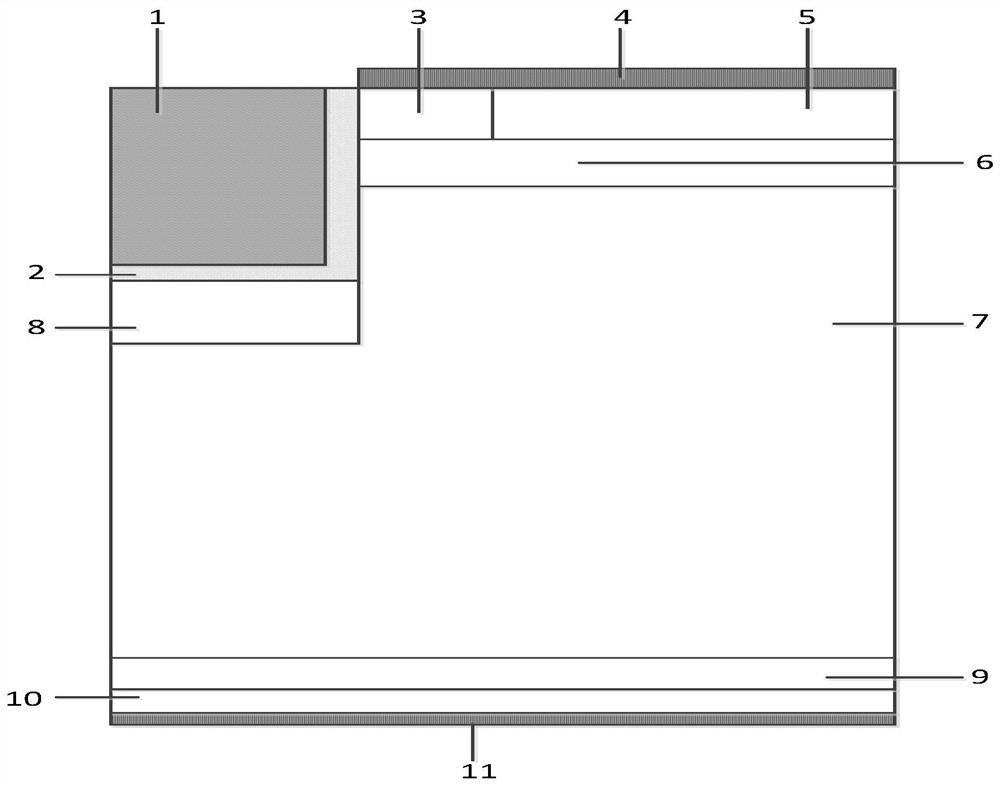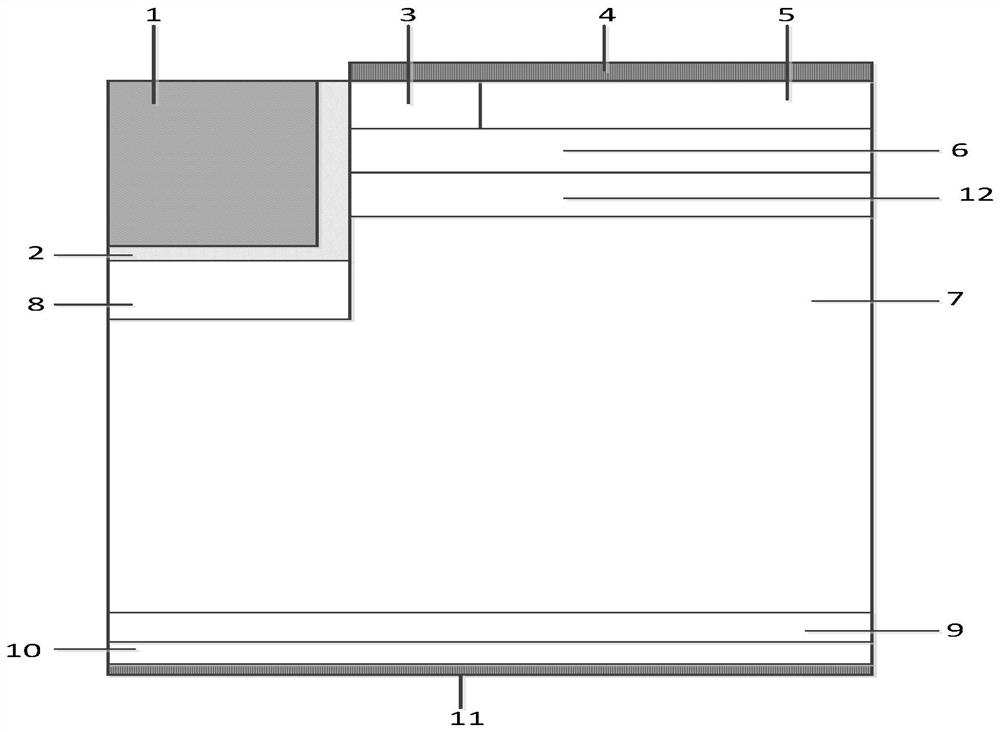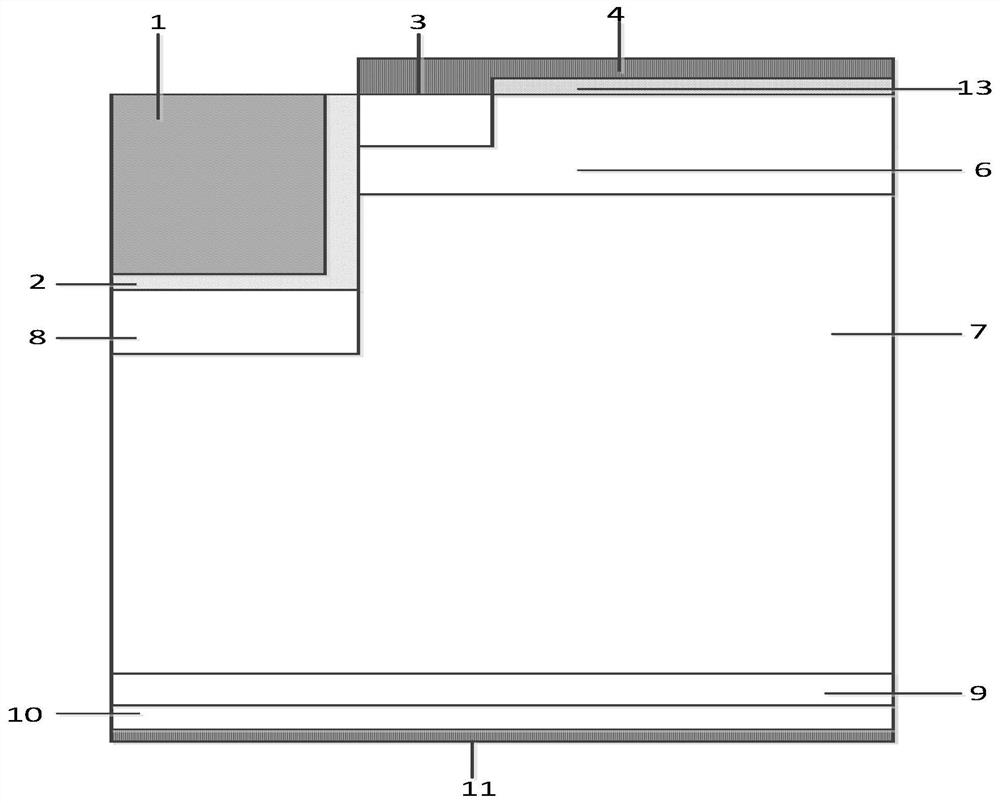A trench type insulated gate bipolar transistor and its preparation method
A bipolar transistor, insulated gate technology, used in semiconductor/solid-state device manufacturing, semiconductor devices, electrical components, etc., can solve the problem of increasing forward voltage drop, increasing device drift region, forward voltage drop and turn-off loss. It can reduce the conduction voltage drop, optimize the turn-off loss, and enhance the conductance modulation effect.
- Summary
- Abstract
- Description
- Claims
- Application Information
AI Technical Summary
Problems solved by technology
Method used
Image
Examples
Embodiment 1
[0053] This embodiment provides a trench-type silicon carbide insulated gate bipolar silicon carbide transistor, the half-cell structure of which is as follows image 3 As shown, it includes: metallized collector electrode (11), P-type silicon carbide collector region (10), N-type silicon carbide field stop layer 9, N-silicon carbide drift region (7), P-type silicon carbide base region ( 6), N+ silicon carbide emitter region (3), trench gate structure and emitter metal (4); the metallized collector (11) is located on the back of the P-type silicon carbide collector region (10), and the N-type silicon carbide field The stop layer 9 is located on the front of the P-type silicon carbide collector region (10), and the N-silicon carbide drift region (7) is located on the front of the N-type silicon carbide field stop layer 9; the P-type silicon carbide base region (6) and the N+ carbide The silicon emitter region (3) is located side by side under the emitter metal (4), wherein the ...
Embodiment 2
[0059] This embodiment provides a trench-type silicon carbide insulated gate bipolar silicon carbide transistor, the half-cell structure of which is as follows Figure 4 As shown, in this embodiment, on the basis of Embodiment 1, the first P-type silicon layer 13 is arranged to extend into the lower P-type base region 6 to form a trench, and the first P-type silicon layer 13 is formed in the trench. The bottom and side walls of the groove form a heterojunction with the P-type base region 6 and the N-type emitter region 3; the groove depth of the first P-type silicon layer 13 can be the same as that of the N+ emitter region 3, or it can be different.
[0060] Compared with Embodiment 1, this embodiment reduces the parasitic resistance formed in the P-type base region 6, reduces the voltage drop formed by the hole current in the P-type base region 6, and further suppresses the possible dynamic latch of the device. lock, which improves the high current shutdown capability of the ...
Embodiment 3
[0062] This embodiment provides a trench-type silicon carbide insulated gate bipolar silicon carbide transistor, the half-cell structure of which is as follows Figure 5 As shown, the schematic cross-sections along the lines AB and CD of the semi-cellular structure are shown in Image 6 with 7 As shown, this embodiment is based on Embodiment 2, which introduces a second P-type silicon layer 14 in the first P-type shielding layer 8, and the second P-type silicon layer 14 is externally connected to the emitter metal 4. The second P-type silicon layer 14 forms a heterojunction with the first P-type shielding layer 8 .
[0063] Compared with Embodiment 2, this example makes the first P-type shielding layer 8 not in the floating state, thereby solving the problem of the first P-type shielding layer 8 floating in the air. In the off state, although the negative charge in the floating P-type shielding layer can suspend part of the electric field lines, modulate the electric field a...
PUM
| Property | Measurement | Unit |
|---|---|---|
| thickness | aaaaa | aaaaa |
| thickness | aaaaa | aaaaa |
| thickness | aaaaa | aaaaa |
Abstract
Description
Claims
Application Information
 Login to View More
Login to View More - R&D Engineer
- R&D Manager
- IP Professional
- Industry Leading Data Capabilities
- Powerful AI technology
- Patent DNA Extraction
Browse by: Latest US Patents, China's latest patents, Technical Efficacy Thesaurus, Application Domain, Technology Topic, Popular Technical Reports.
© 2024 PatSnap. All rights reserved.Legal|Privacy policy|Modern Slavery Act Transparency Statement|Sitemap|About US| Contact US: help@patsnap.com










